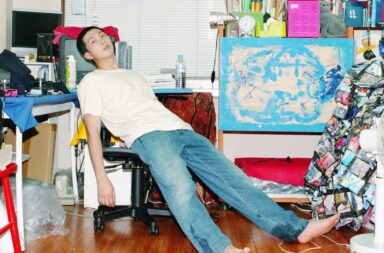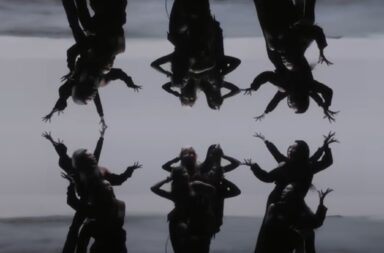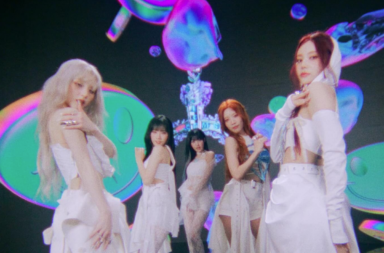Another summer, another SB Mid-Year Review! After sharing about the full-length albums that stood out from the offerings so far this year, Anna, Lo, and Sara move on to discuss the mini albums that captured their hearts.
Lo: Looking at the EPs, you two once again share one that just… completely failed to engage me. So, tell me what I’m missing about Hoppipolla and And Then There Was Us.
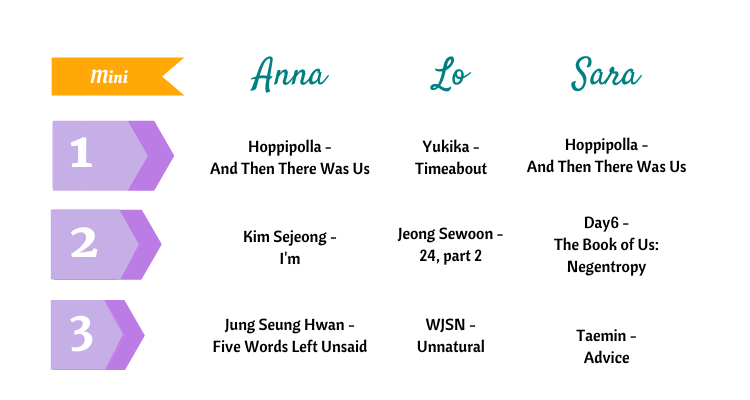
Sara: Choosing Hoppipolla’s And Then There Was Us as my No. 1 was the easiest decision I made. I was a little nervous about whether I would like this album or not since I practically ascended when I first listened to Spring to Spring (which Anna introduced me to in her album review!). Originally, I was on the fence about “Your Ocean”—even as a ballad lover, the track felt a bit stuck. However, it grew on me. I couldn’t get the song out of my head. I’m not kidding when I say I have to lie down when the electric guitar kicks in, followed by the cello, rapidly climbing to the peak of the track. And don’t get me started about how Ha Hyunsang and I’ll’s voices are perfect together. I can stay on that soapbox forever.
Moreover, I was drawn to the darker tone And Then There Was Us possessed. Compared to Hoppipolla’s debut effort, their sophomore album surrounds listeners with vulnerability and an unsettledness with “Where Is.” Although the shortest track, this one resonates long after you listen to it. The slowly growing notes combined with the staccato rhythm of the cello contrast with the evenness of Ha Hyunsang’s vocals. And then the repetition of “We’re losing our humanity / We’re facing our insanity” gives me chills every time. Overall, the tracks flow easily from one to the other, yet each song has its own uniqueness. Cellist Hong Jinho and guitarist Kim Youngso were given their time to shine in “Wander,” while “Unnatural” captures the ear quickly with I’ll’s trembling “unnatural.” And Then There Was Us did not lose the emotional quality of Spring to Spring, but I do think Hoppipolla pushed their musical sophistication one step further.
Hoppipolla’s album also took your number one spot, Anna. What did it for you?
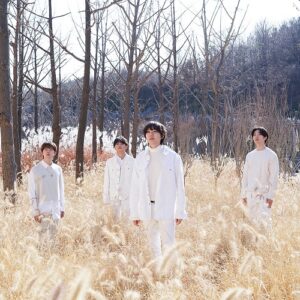
Anna: I completely echo your sentiments about “Your Ocean”, Sara. I remember being slightly underwhelmed by it the first time I heard it, but the more I listened to it, the more I began to appreciate the details that went into it. The band was actually split on their decision about whether to include Youngso’s guitar riff, and I’m so thankful that they chose to insert it–it’s perfection. I also really enjoyed “Mom”. Its lyrics resonate a lot with me, and I was reminded of my relationship with my father (oops wrong parent) while listening to it. Their sincerity really shines through the music they create, and they truly excel at their craft. And Then There Was Us is a fantastic expression of that.
Just as Hoppipolla has their unique colour, Yukika’s music is also so iconic and distinct. What about timeabout caught your attention, Lo?
Lo: I fell in love with Yukika’s debut album, Soul Lady, last year, and timeabout cemented her as a favorite. While her previous work was textbook city pop, timeabout sees her refine her sound and lyricism. There’s still the organic sounds one expects from a city pop artist but now with a distinct bend towards dreampop. It’s a very floaty EP, full of twinking synths and light flourishes that give timeabout an ethereal feel. By design, nothing sinks in.
On timeabout, Yukika reveals herself as a fantasizer. timeabout shows her she participates in a relationship: by spending most of her time thinking about it. She stays up all night imagining things between them and obsesses over their dates. She adores the infatuation and drama of it all, with the boyfriend as a prop more than a partner. Even the revelation that it’s a secret romance, so she probably can’t see him much doesn’t temper the image Yukika paints of herself as someone who prefers fantasy to reality, because reality is boring, and this? It’s unhealthy, untenable, and unstable, but boring it ain’t, and that’s what counts.
While I have great appreciation for my fellow daydreamers, Sara, you preferred someone a little more grounded. What about Taemin’s Advice won you over?
Sara: Just like with Shinee, Taemin has been slowly creeping into my regular music rotation. Besides the title track “Advice,” I’ve had “If I could tell you,” a duet with Taeyeon, and “Sad Kids” on repeat. While I love his past dance-driven songs, it was a pleasant surprise to hear that Advice spotlights mid-tempo tracks and Taemin’s vocal abilities. The sparse beat of “If I could tell you” gives Taemin and Taeyeon’s gentle voices to weave and blend, Taemin’s being more grounded and Taeyeon’s possessing an airy quality. This song, along with “Advice,” showcases the strength of his falsetto as well. Plus, I’m a sucker for anything electric guitar, and both “Strings” and “Sad Kids,” the sequel to “2 Kids,” feature prominent guitar lines. Combined with Taemin’s voice, all of the songs on Advice make for smooth listening, and my ears have been very happy.
I recently listened to Jung Seung Hwan’s Five Words Left Unsaid, and if I had listened to it earlier, this album might’ve competed for a spot on my list! Anna, what drew you to this mini?
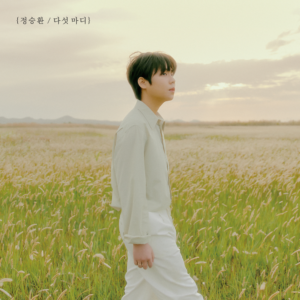
Anna: The five tracks of Five Words Left Unsaid quickly burrowed their way into my heart (and my Korean ballad Spotify playlist). Although the tracks of this album are all within the ballad genre, they each tell their own story, presenting the bittersweet process of falling in and out of love. The warm and emotional “The Spring Day Passes” is a personal favorite, while title track “We, From The First” reminds listeners once again of what a talent Jung Seung Hwan is. IU composed the song “Love Letter” to close off this album, and I will not stop raving about her amazing lyrical abilities! As I listened to this calming song, I imagined an old couple singing this to each other, reminiscing about the time that they first fell in love. These memories are built upon the little things–the lovely handwriting, the quiet alley, the occasionally poor whistling. Jung’s emotive voice really brings to life IU’s poetic lyrics, and I hope this duo can continue working together–this is definitely a partnership I can get behind.
In the realm of male vocalists, I really enjoy Jeong Sewoon’s music as well, and 24 (Part 2) was no exception. What stood out for you about that album, Lo?
Lo: I don’t usually go for the dude with acoustic guitar sound, but Jeong Sewoon grabbed me from the first note. The first thing that struck me was the complexity of his compositions. Rather than go for a sparse, “authentic” sound, he uses the guitar as a base to explore other sounds: jazz, deceptively nuanced ballads, and a recurring sense of slick cool. Yet the disparate styles are unified through the organic instrumentation and the warmth of the EP. Not only on the vocals, though Jeong Sewoon’s voice is inviting and soothing in all the right ways to just melt the listener. 24 Part 2 is a healthy and supportive relationship set to music. From start to end, he offers his partner exactly what’s needed. Support on “In the Dark”, reassurance on “Fine”, quality time on “DoDoDo”. The entire EP burns not with lust or passion but the quiet contentment of being in a stable relationship with someone who makes you happy. Jeong Sewoon highlights the difference between settling down and just settling, because this slice of domesticity has quickly become the thing I want most in my life.
Our last picks see us all veering a little closer to the idol scene. Sara, I’ve found Day6’s Book of Us series to be uneven as a whole and within projects. What about The Book of Us: Negentropy impressed you?
Sara: The Book of Us: The Demon didn’t really catch my attention last year, but Entropy and Gravity definitely did, so I’m glad that Negentropy turned out to be exactly what I needed. Similar to my first reaction to Hoppipolla’s “Your Ocean,” Day6’s title track, “You make Me,” didn’t leave the strongest impression on me. But I think that’s part of its charm—there still is something that pulls me back for another listen, including Young K’s belted notes during the chorus. Meanwhile, “everyday we fight” catches the ear very quickly and loops in your brain, which propels listeners to dive deeper into the album. “Healer” became a favorite of mine, probably because it reminds me of their earlier releases like “Free Freely” from The Day (yes, all the way back). It has a nostalgic feeling, although it is an energetic song, of concert halls, of notes sung at the top of everyone’s lungs, and the surprise of confetti falling around you.
With Sungjin fulfilling his military service, and the end of their current contract with JYP coming up soon, another OT5 release is not certain. Negentropy draws on Day6’s roots—especially the strength of their emotional storytelling—while also building off these solid foundations to showcase their maturity as a band and a further establishment of their sound. I do have to say, though, if Onewe released their mini album Planet Nine: Alter Ego just a few weeks earlier, I think this project would have made my list, though Negentropy would stay.
Like Day6’s album, Kim Sejeong’s I’m captured your second spot, Anna. What made it stand out for you?
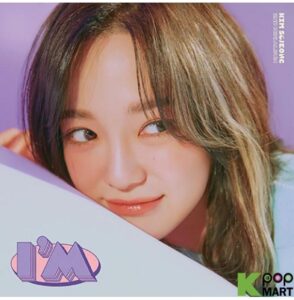
Anna: I’ve kept my eye on Kim Sejeong since her time in I.O.I and it’s lovely to see her flourishing both in the music scene and as an actress. I’m was just all round enjoyable, proving her versatility as a musician. From the playful and addictive “Warning” to the sultry “Teddy Bear” and the emotional “Maybe I am”, each track demands something different from her, and she fulfills the tasks perfectly. “Do dum chit” was my favourite of this album because of its fascinating instrumentation and the animated way Sejeong performs this piece. She tells a story through her voice very effectively, altering her resonance and breathiness to convey the different emotions of each song. Interestingly enough, if I did not know that these tracks were all part of the same album, I might have thought that they were all from different artists – that’s how different she sounds in each song. It’s fascinating to find a singer with this many layers, and I’m excited to hear more of her music in the future.
Coincidentally enough, Lo, another former I.O.I member, Yeonjung, made your top picks together with her group, WJSN. What did you like about Unnatural?
Lo: Let’s start with the recurring theme of “I love the 80s”. WJSN have some great 80s sounds, but unlike Yukika or Shinee, Unnatural isn’t pure retraux. Instead, it’s a melding of the sleekly polished but still organic production of the 80s with contemporary sounds–drops, modern EDM synth tones, denser production. And as much as I love throwbacks, it’s wonderful seeing WJSN push forwards. Unnatural sees WJSN maintain their very feminine brand of synthpop while leaving behind the girlishness I’ve always found off-putting. There’s a sharpness to the production that provides a sense of maturity. This is only improved when paired with WJSN’s unshakable self-confidence. There is no doubt anywhere on this EP, tempered by an undercurrent of “c’est la vie”. The make it clear they will give a relationship their all . . . but also won’t be devastated if it doesn’t work. They tried, it fizzled, might as well move on with some good memories. It’s an unusual tone, but WJSN carry it off with aplomb.
So those are the best albums and EPs of 2021. While the field may have been leaner than we liked, I feel each of our picks certainly deserves recognition for their excellence.
(Images via Moss Music, Ubuntu Entertainment, Antenna, Jellyfish Entertainment, YouTube [1] , [2], [3], [4])
